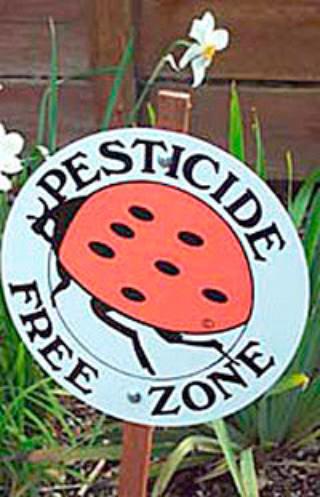King County urges residents to take a pledge and join more than 800 parks and trails in King County that use few to no pesticides.
King County and Washington Toxics Coalition are offering Pesticide Free Zone ladybug signs free to families gardening without pesticides.
“We are pleased to partner with King County to offer families an attractive way to share their pesticide-free yards with neighbors and friends,” said Anna Dyer of Washington Toxics Coalition. “Pesticide Free Zone signs spread the word that our yards and parks can be beautiful and healthy for kids, adults and wildlife.”
Kids are most at risk from contact with toxic chemicals like pesticides as they crawl, roll and play on lawns – and chemical exposures can have life-long impacts.
Families in King County that take care of their yard with no pesticides can take a
pledge and get the sign to recognize their efforts. Order your sign at the Washington Toxics Pesticide Free Zone page http://watoxics.org/healthy-living/healthy-homes-gardens-1/pesticide-free-zone/pesticide-free-zone-main/.
Play worry free at more than 800 Pesticide-Free Places: www.HazWasteHelp.org/Pesticide-FreePlaces. The map shows public places in King County where park staff are using few to no pesticides in their lawn care. They are working to keep employees and visitors safe, and protecting streams, Puget Sound and the animals that call these places home.
King County Parks manages more than 26,000 acres of parks and natural lands. Of the 189 total sites, 102 are pesticide free and 87 are pesticide reduced.
Seattle Parks and Recreation has been reducing pesticides since 2001 at 390 parks, and is maintaining more than 4,550 acres with few to no pesticides.
Other cities that manage their parks pesticide-free are: Black Diamond, Duvall,Shoreline and Hunts Point. Cities that manage their parks pesticide-free or with limited pesticide use are Auburn, Bellevue,Burien, Kenmore, Kirkland, Medina,Mercer Island, Newcastle, Redmond, SeaTac, SnoqualmieandSkykomish.
In the region, the Port of Seattle, Washington State Department of Natural Resources and the US Forest Service also take care of their properties in a pesticide-free or reduced manner.
For help with pesticide alternatives, call the Garden Hotline at 206-633-0224, or visitwww.GrowSmartGrowSafe.org.
Find EnviroStars businesses that commit to practices that minimize pesticide use, keep the environment clean and your landscape healthy athttp://envirostars.org/
The Local Hazardous Waste Management Program is a partnership of local governments including Seattle, King County, suburban and other cities in King County, working together to manage hazardous wastes and protect health and the environment. Visit www.hazwastehelp.org.
Support for this project is provided through a partnership between the Local Hazardous Waste Management Program and Washington Toxics Coalition.


